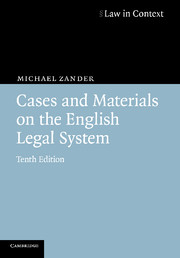Book contents
- Frontmatter
- Contents
- Preface to the tenth edition
- Preface to the First edition
- Acknowledgements
- Command papers, Hansard, House of Commons papers and other official publications excerpted
- Books, pamphlets, memoranda, speeches and articles excerpted
- Table of statutes
- Tables of cases
- CHAPTER 1 The organisation of trial courts
- CHAPTER 2 Pre-trial civil proceedings
- CHAPTER 3 Pre-trial criminal proceedings
- CHAPTER 4 The trial process
- CHAPTER 5 The jury
- CHAPTER 6 Costs and the funding of legal proceedings
- CHAPTER 7 Appeals
- CHAPTER 8 The legal profession
- Index
CHAPTER 6 - Costs and the funding of legal proceedings
Published online by Cambridge University Press: 05 June 2012
- Frontmatter
- Contents
- Preface to the tenth edition
- Preface to the First edition
- Acknowledgements
- Command papers, Hansard, House of Commons papers and other official publications excerpted
- Books, pamphlets, memoranda, speeches and articles excerpted
- Table of statutes
- Tables of cases
- CHAPTER 1 The organisation of trial courts
- CHAPTER 2 Pre-trial civil proceedings
- CHAPTER 3 Pre-trial criminal proceedings
- CHAPTER 4 The trial process
- CHAPTER 5 The jury
- CHAPTER 6 Costs and the funding of legal proceedings
- CHAPTER 7 Appeals
- CHAPTER 8 The legal profession
- Index
Summary
The cost of legal proceedings is widely regarded as the single greatest concern confronting the justice system. For civil justice the costs concern a variety of funders – individuals, companies, trade unions, insurers and the public purse. For criminal justice the costs fall mainly on the taxpayer.
The problem of costs bedevils all legal systems – who should pay them, how to keep them under control and what assistance is available for those unable to afford them. These are some of the topics addressed in this chapter.
The new rules
In civil cases the court's power to award costs in contentious matters flows from the Supreme Court Act 1981, s. 51 which provides that, subject to statute and rules of court, ‘the costs of and incidental to all proceedings … shall be in the discretion of the court’. The rules are now to be found in the Civil Procedure Rules Parts 43–48. CPR 44.3(1) says that the court has a discretion as to whether costs are payable by one party to another, the amount of those costs and when they are to be paid.
Who pays?
Under the old rules the position regarding contentious matters was clear and almost mechanical. Although according to the rules the court had a complete discretion, in fact, save in exceptional circumstances, the loser paid. At the end of the case, counsel for the winner asked for the ‘usual order as to costs’ which was made more or less automatically.
- Type
- Chapter
- Information
- Cases and Materials on the English Legal System , pp. 556 - 653Publisher: Cambridge University PressPrint publication year: 2007



